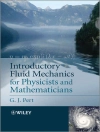Without sacrificing scientific strictness, this introduction to the field guides readers through mathematical modeling, the theoretical treatment of the underlying physical laws and the construction and effective use of numerical procedures to describe the behavior of the dynamics of physical flow.
The book is carefully divided into three main parts:
– The design of mathematical models of physical fluid flow;
– A theoretical treatment of the equations representing the model, as Navier-Stokes, Euler, and boundary layer equations, models of turbulence, in order to gain qualitative as well as quantitative insights into the processes of flow events;
– The construction and effective use of numerical procedures in order to find quantitative descriptions of concrete physical or technical fluid flow situations.
Both students and experts wanting to control or predict the behavior of fluid flows by theoretical and computational fluid dynamics will benefit from this combination of all relevant aspects in one handy volume.
Tabela de Conteúdo
1. Ideal Fluids
2. Weak Solutions of Conservation Laws
3. Entropy Conditions
4. The Riemann Problem
5. Real Fluids
6. Existence Proof for Entropy Solutions by Means of Discretization Procedures
7. Types of Discretization Principles
8. A Closer Look into Discrete Models
9. Discrete Models on Curvilinear Grids
10. Finite Volume Models
11. Simple Meshless Models
Sobre o autor
Dr. Rainer Ansorge
Em. Professor of Mathematics
Technical University Hamburg-Harburg
Hamburg, Germany
Rainer Ansorge studied Mathematics and Physics at the Free University and Technical University (TU) of Berlin, Germany. After positions as computational engineer at the Volkswagen Company (1956) he became Full Professor of Mathematics at the University of Hamburg, Germany (1969). He was one of the founders of the TU Hamburg-Harburg (1974-1986) and his scientific research activities are covering more than 20 countries. Prof. Ansorge is member of the European Academy of Sciences and Arts, of the New York Academy of Sciences and the GAMM.
Prof. Dr. Thomas Sonar
University of Braunschweig
Institute of Computational Physics
Braunschweig, Germany
Prof. Sonar is head of the group Partial Differential Equations at the Institute of Computational Mathematics of the University of Braunschweig. His main fields are: Numerics of the partial differential equations, numerical fluid mechanics and analysis of discrete data.












